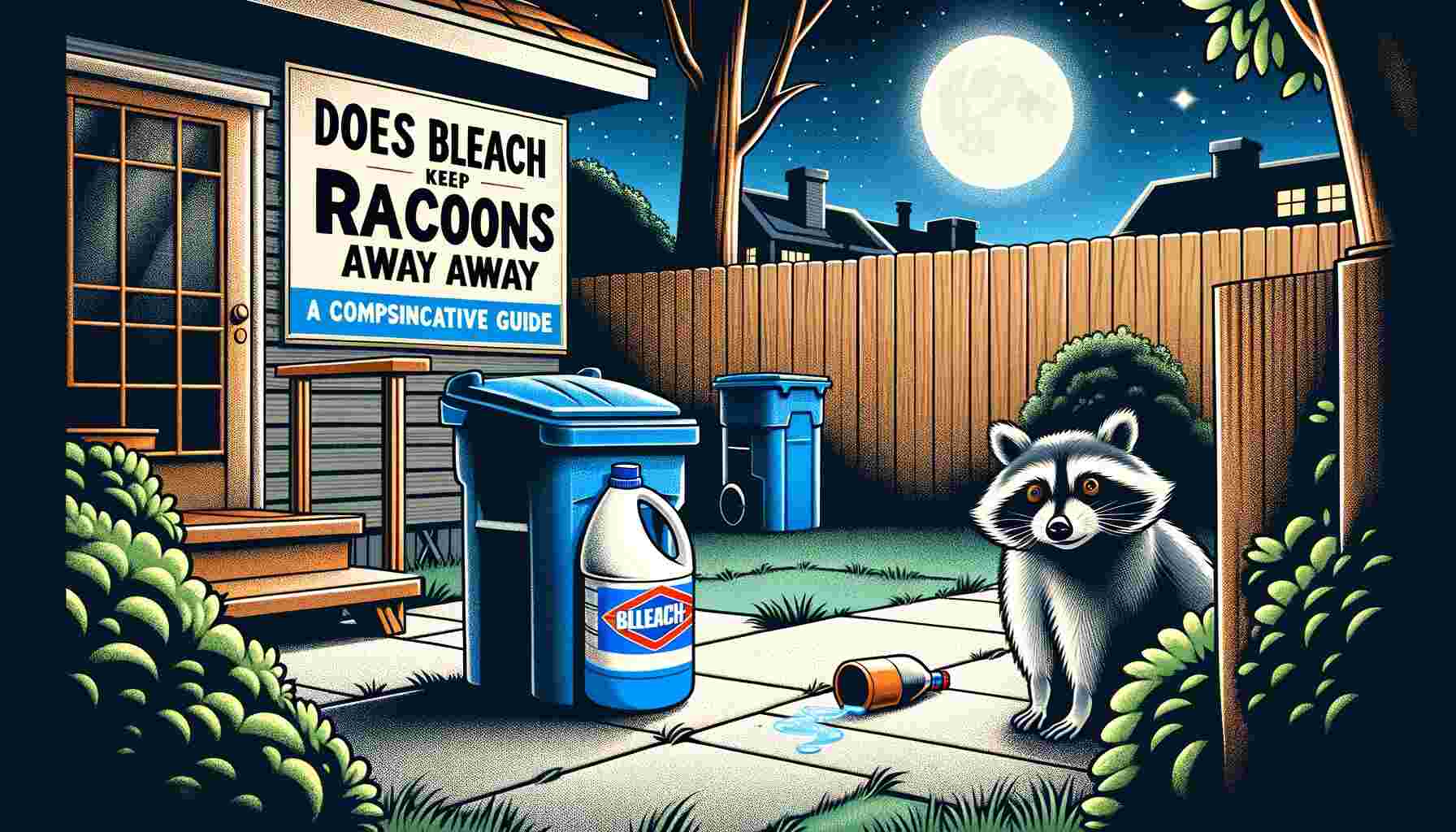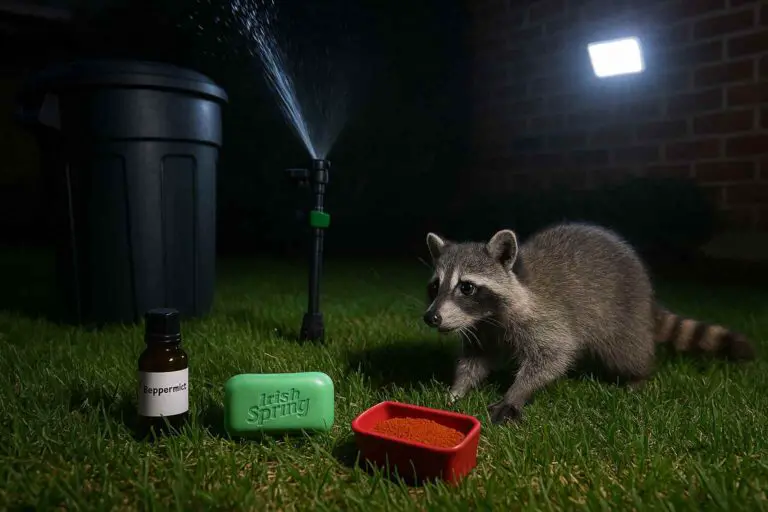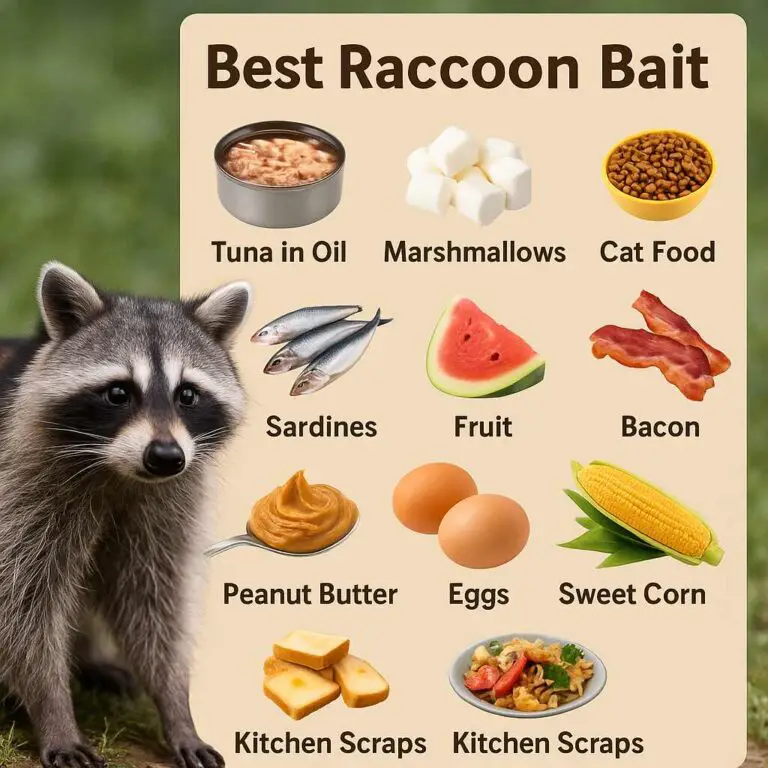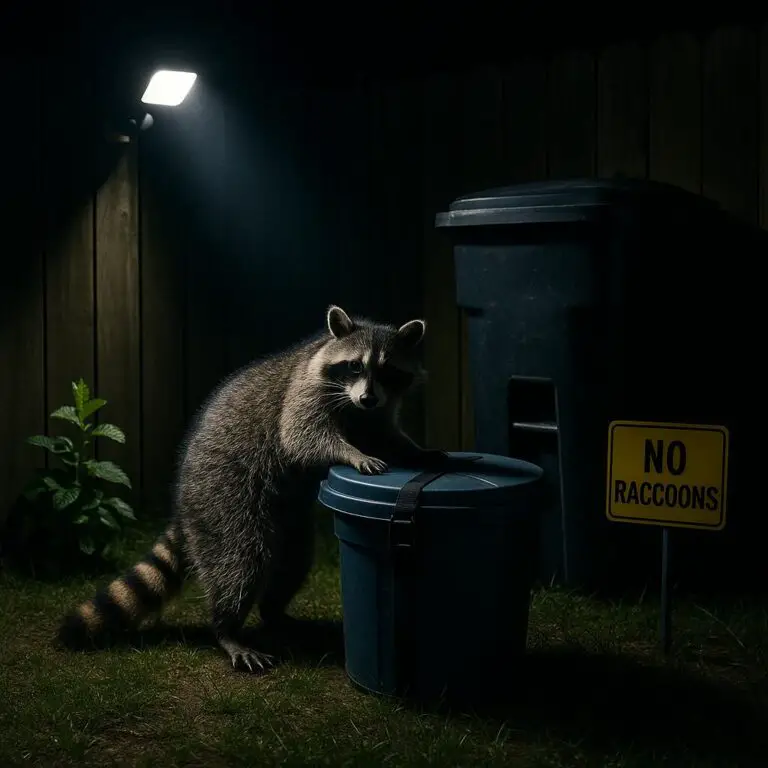Raccoons, with their adorable faces and clever antics, can be a nuisance when they decide to visit your property. These masked bandits are known for rummaging through trash cans, raiding gardens, and causing general havoc. If you’ve been searching for ways to deter raccoons from invading your space, you might have come across the idea of using bleach as a repellent. But does bleach really keep raccoons away?
Yes, bleach does have a strong odor that can deter raccoons temporarily. You can spray it around trash cans or other areas you want to protect. However, bleach should be used with caution as it’s a harsh chemical and can be harmful to the environment.
There are more humane and eco-friendly methods that are often more effective in the long run which we will discuss in this comprehensive guide.

Understanding Raccoon Behavior
Before we delve into the use of bleach as a raccoon deterrent, it’s important to understand why raccoons are attracted to certain areas and what drives their behavior.
1. Omnivorous Diet
Raccoons are opportunistic feeders, which means they’ll eat just about anything. Their diet includes fruits, vegetables, insects, small mammals, and even human food. This broad diet makes them adaptable and persistent foragers.
2. Nocturnal Creatures
Raccoons are primarily nocturnal animals, which means they are most active during the night. This behavior can make it challenging to spot them in action.
3. Curiosity and Intelligence
Raccoons are highly intelligent animals. Their curiosity often leads them to explore new environments, including urban and suburban areas, where they can find food and shelter.
4. Strong Climbers
These animals are excellent climbers, and they can scale fences and trees with ease. This makes it difficult to keep them out of your property if they are determined to get in.
Does Bleach Repel Raccoons?
Well, yes, bleach can act as a raccoon repellent, but it’s not a long-lasting fix. Raccoons will eventually get used to the bleach smell and might ignore it.
The idea behind using bleach to repel raccoons is rooted in the belief that the strong smell of bleach will deter them. However, the effectiveness of this method is a subject of debate.
The Argument in Favor of Bleach
- Strong Smell: Bleach has that distinct, potent smell that can make anyone wrinkle their nose. Some folks think that if you sprinkle it around your property or soak rags in it, raccoons might be put off and stay away.
- Cleaning Power: People also use bleach to clean up trash cans and outdoor areas, hoping that the leftover bleachy scent will discourage raccoons from visiting.
The Argument Against Using Bleach
- Lack of Solid Proof: There isn’t a ton of scientific evidence backing up bleach as a surefire raccoon repellent. Raccoons do have a keen sense of smell, but whether bleach consistently keeps them at bay is still up for debate.
- Potential Downsides: Using bleach in this way can be bad news for the environment and other critters. It could even be risky for your pets and kiddos if you’re not careful.
- Temporary Fix: Raccoons are pretty clever critters. They might get used to the bleach smell over time, making it less effective as a long-term solution.
So, while bleach can work as a quick fix, it’s not a guaranteed long-term solution. You’ll need to keep reapplying it, and there are some safety and environmental concerns to consider.
But hey, if you’re not too keen on using bleach, there are more natural alternatives like peppermint oil, pepper, cayenne powder, or vinegar that might do the trick without the same risks. Ultimately, if raccoons are giving you a persistent headache, reaching out to a local wildlife control pro might be your best bet for a lasting solution.
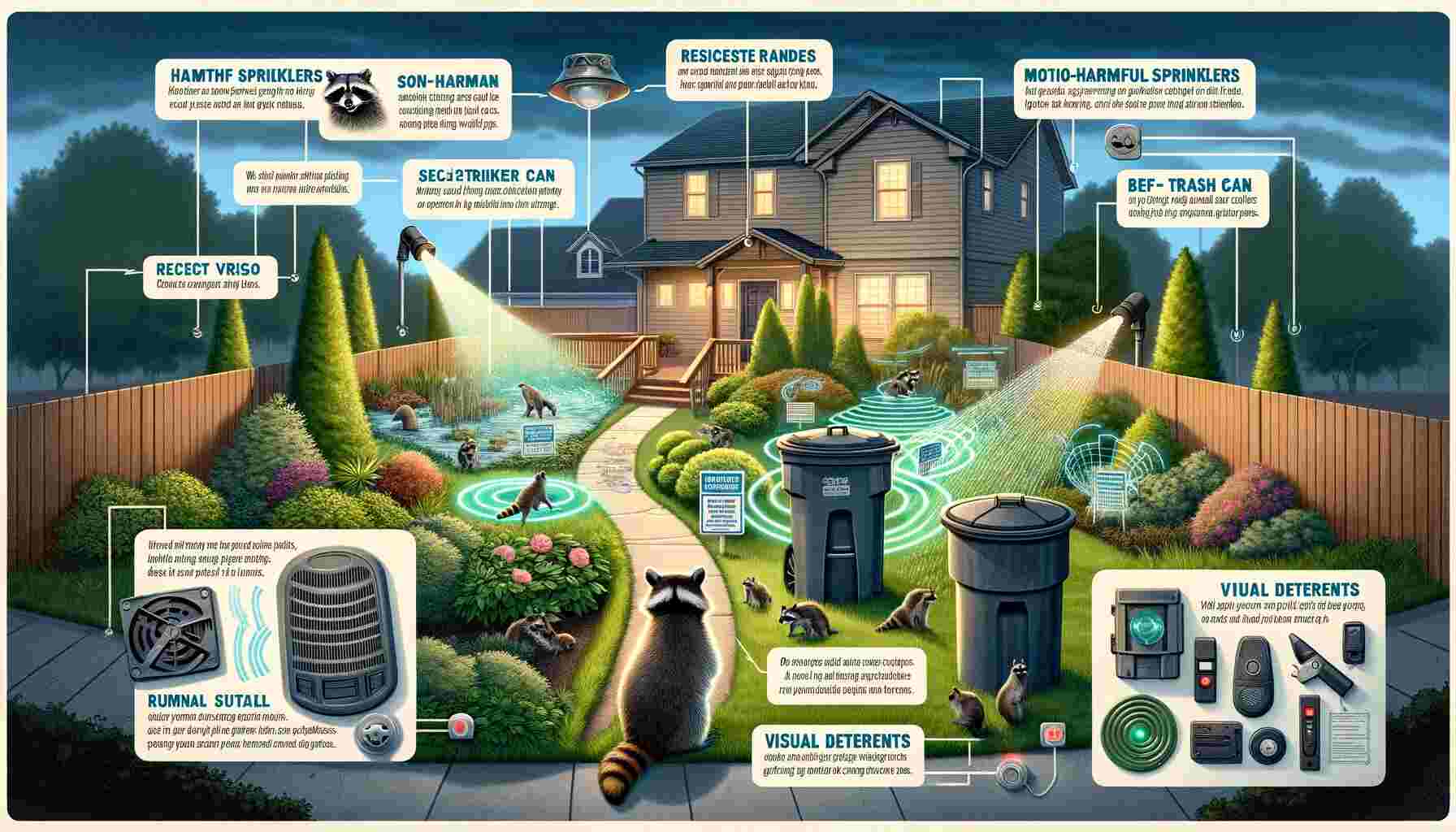
Alternative Methods to Keep Raccoons Away
If you’re looking for more effective and humane ways to keep raccoons at bay, consider these alternatives. Here is how to keep raccoons out of trash cans!
1. Secure Trash Cans
Raccoons are often attracted to trash cans, where they can find food scraps. Invest in raccoon-proof trash cans with secure lids to prevent them from accessing your garbage.
2. Seal Entry Points
Inspect your property for any potential entry points, such as holes or gaps in fences and walls. Seal these openings to make it difficult for raccoons to enter.
3. Motion-Activated Lights and Alarms
Raccoons prefer darkness, so installing motion-activated lights or alarms can startle them and discourage them from approaching your property.
4. Use Natural Deterrents
Some natural substances, like cayenne pepper or ammonia, can be used as raccoon deterrents. Sprinkle these substances in areas where raccoons frequent.
5. Live Traps
Consider using live traps if raccoons are causing significant problems. Once trapped, you can release them safely in a more suitable habitat.
6. Professional Wildlife Removal
If raccoons persistently invade your property and become a serious nuisance, it’s best to consult with a professional wildlife removal service. They can safely and legally remove the animals from your premises.
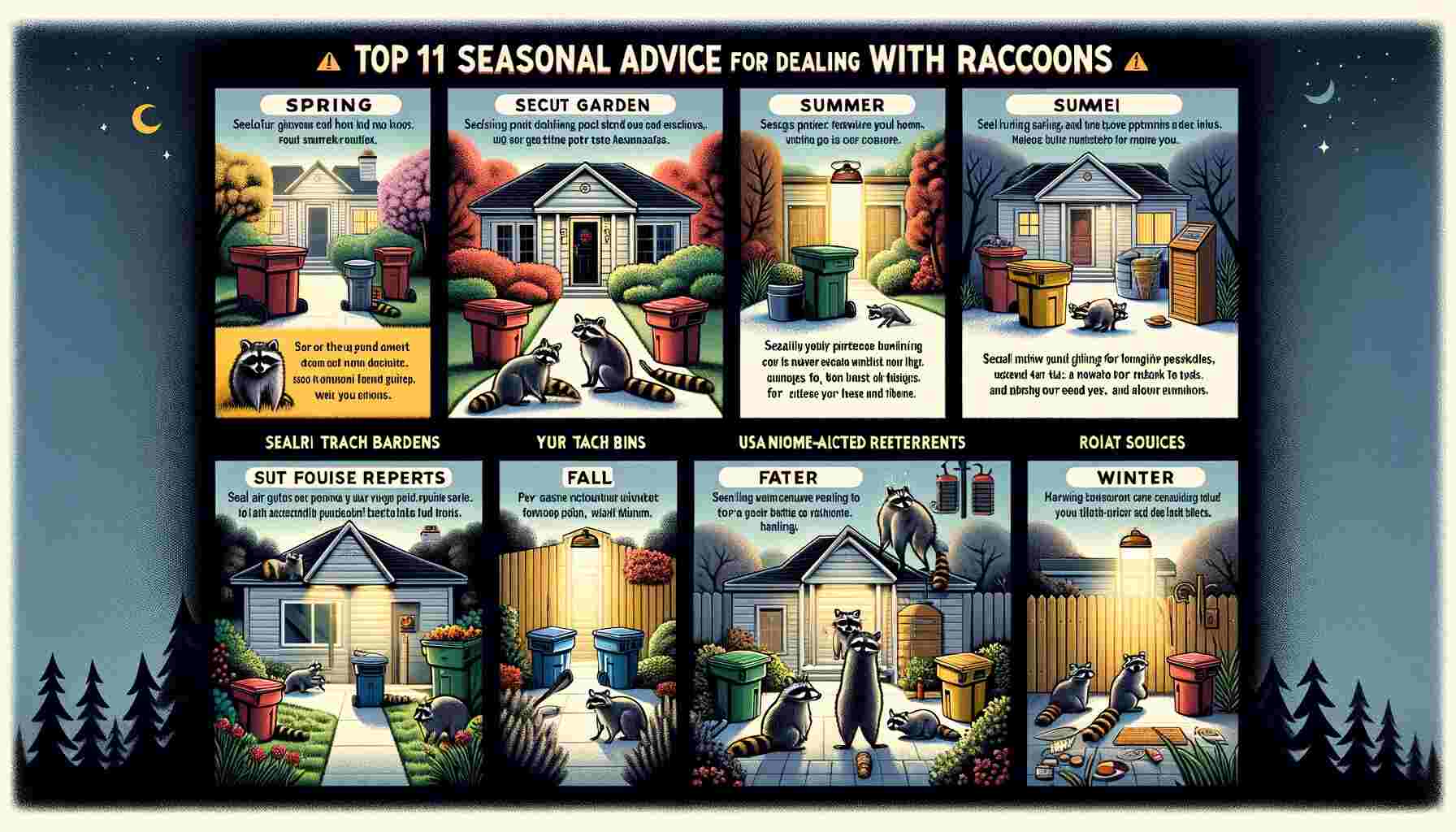
Top 11 Seasonal Advice For Dealing with Raccoons
Dealing with raccoons can indeed vary depending on the season, as their behavior and needs change throughout the year. Here are some seasonal tips for dealing with raccoons during different times of the year:
Spring (Breeding Season)
1. Be Cautious with Traps: Spring is when raccoons give birth to their young kits. If you’re using live traps, exercise caution to avoid separating mother raccoons from their babies. It’s best to avoid trapping during this time unless absolutely necessary.
2. Secure Entry Points: Female raccoons often seek warm, safe places to give birth and raise their kits. Inspect your property for potential entry points, like attics or crawl spaces, and secure them to prevent raccoons from nesting indoors.
3. Monitor for Signs of Activity: Keep an eye out for signs of raccoon activity around your property, such as paw prints, overturned trash, or digging. Promptly address any issues to deter raccoons from establishing nests.
Summer
4. Avoid Leaving Pet Food Outside: Raccoons are more active during the summer months. If you have outdoor pets, bring their food dishes indoors at night to avoid attracting raccoons and other wildlife.
5. Maintain Raccoon-Proofing Measures: Continue to maintain your raccoon-proofing measures, such as secure trash cans and motion-activated deterrents, as raccoons remain active and may become bolder in their search for food.
Fall
6. Harvest Fruits and Vegetables: Raccoons are attracted to gardens with ripe fruits and vegetables. Harvest your garden produce promptly to reduce the temptation for raccoons.
7. Seal Up Entry Points: As temperatures drop, raccoons may seek shelter indoors. Inspect your property for any new or reopened entry points and seal them before winter sets in.
Winter
8. Keep Trash Secure: During winter, natural food sources become scarcer, making raccoons more reliant on human-generated food. Ensure that your trash cans remain securely sealed to prevent raccoon raids.
9. Consider Bird Feeders: If you have bird feeders, raise them high enough to prevent raccoons from reaching them. Raccoons are known for raiding bird feeders in search of an easy meal.
10. Check for Hibernation: Raccoons are not true hibernators, but they may enter a state of torpor during harsh winter conditions. If you suspect raccoons are sheltering in your property, consult with a wildlife professional for safe removal.
11. Don’t Disturb Dens: Avoid disturbing raccoon dens during the winter months, as female raccoons may have their young kits with them. Wait until spring to address any den-related issues.
Remember that raccoons are adaptable and resourceful creatures, so it’s essential to remain vigilant throughout the year. By following these seasonal tips and being mindful of their behavior, you can better coexist with raccoons while minimizing conflicts. If you encounter persistent issues or have concerns about raccoons on your property, consider consulting with a wildlife expert or local animal control for guidance.
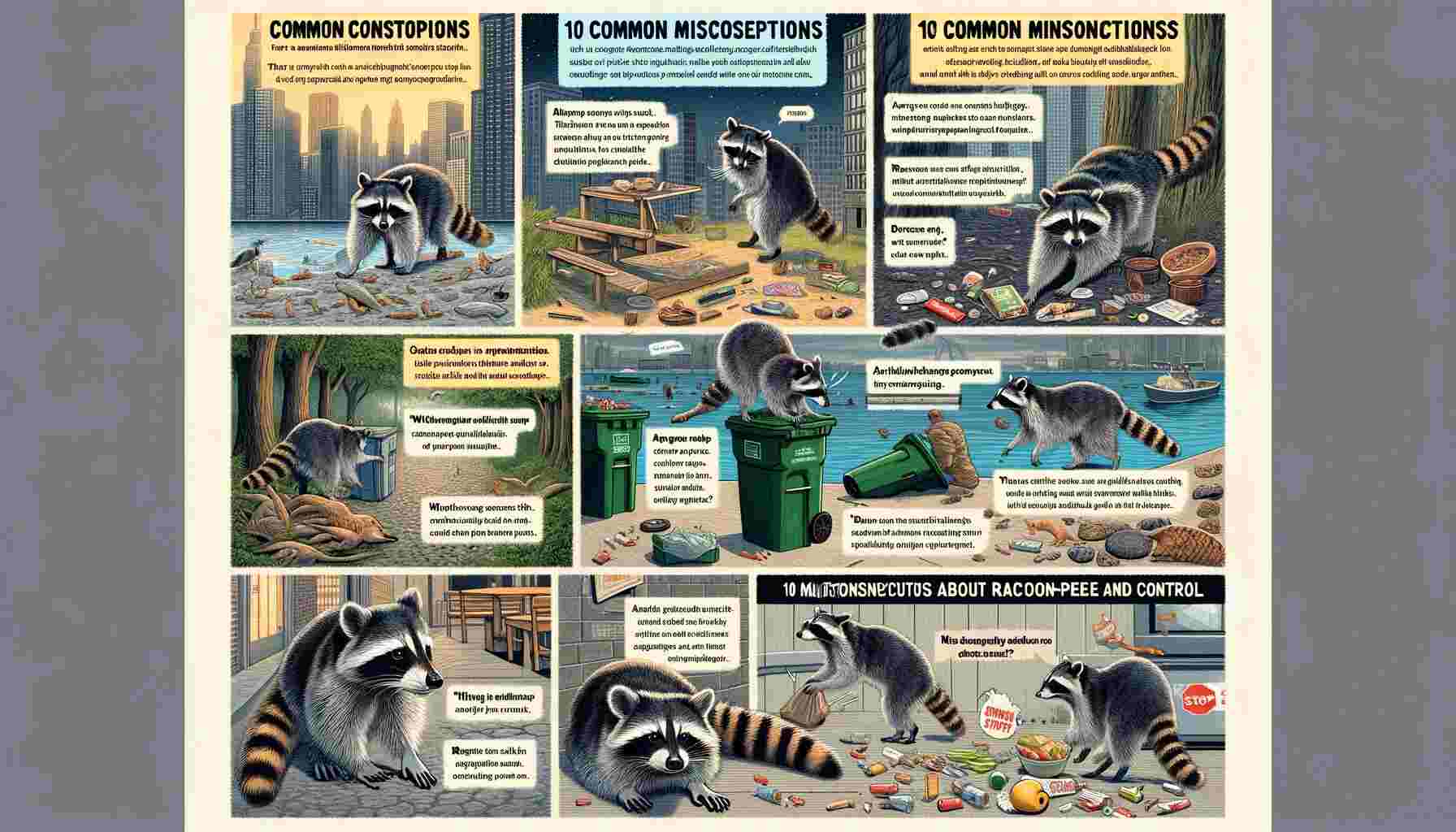
10 Common Misconceptions About Raccoon behavior and control
To ensure accurate understanding, it’s crucial to dispel common misconceptions about raccoon behavior and control:
Myth 1: Raccoons Are Strictly Nocturnal
Reality: Raccoons can also be active during the day, especially in urban areas.
Myth 2: Raccoons Are All Carriers of Rabies
Reality: Not all raccoons are infected with rabies.
Myth 3: Raccoons Wash Their Food Before Eating
Reality: Raccoons’ food-washing behavior is about tactile exploration, not cleaning.
Myth 4: Raccoons Can Be Domesticated as Pets
Reality: Raccoons are wild animals and should not be kept as pets.
Myth 5: Relocating Raccoons Solves the Problem
Reality: Relocation can be ineffective and harmful.
Myth 6: Using Poison Is a Reliable Way to Control Raccoons
Reality: Poison is inhumane and often illegal.
Myth 7: Raccoons Are Unintelligent Animals
Reality: Raccoons are highly intelligent and adaptable.
Myth 8: Feeding Raccoons Keeps Them Away
Reality: Feeding raccoons can create more problems.
Myth 9: Raccoons Are Harmless Pests
Reality: Raccoons can be destructive and carry diseases.
Myth 10: All Raccoon Control Methods Are Equally Effective
Reality: The effectiveness of control methods can vary.
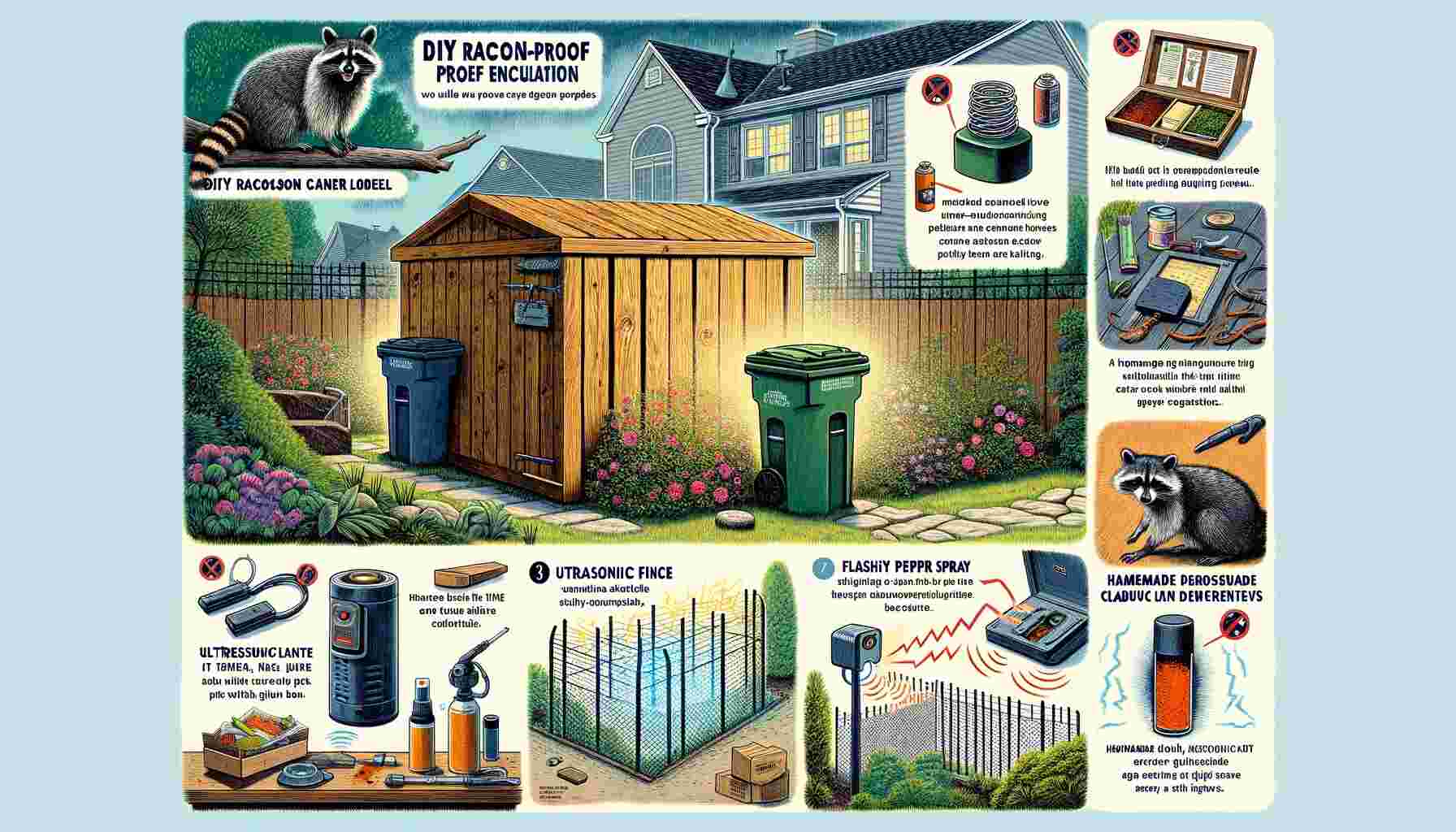
DIY Raccoon-Proof Enclosures and Deterrents
Here are some DIY project ideas to build raccoon-proof enclosures and motion-activated deterrents:
DIY Raccoon-Proof Trash Can Enclosure:
Materials Needed:
- Pressure-treated lumber or PVC pipes
- Hardware cloth or wire mesh
- Hinges and latch
- Screws and screwdriver/drill
- Saw (if cutting lumber)
- Measuring tape
Steps:
- Measure the dimensions of your trash cans to determine the size of the enclosure you need.
- Build a frame using pressure-treated lumber or PVC pipes to match the dimensions of your trash cans. Construct a bottom, four sides, and a top frame.
- Attach hardware cloth or wire mesh to the frame using screws. Make sure it’s securely fastened to prevent raccoons from tearing it open.
- Create a hinged door on one side of the enclosure. Attach hinges and a latch to the door and frame, allowing for easy access to your trash cans.
- Place your trash cans inside the enclosure and secure the door with the latch.
- Ensure the enclosure is stable and anchored to the ground to prevent raccoons from tipping it over.
DIY Motion-Activated Raccoon Deterrent:
Materials Needed:
- Motion-activated outdoor floodlights
- Battery-operated motion sensors
- Screws and screwdriver/drill
- Optional: Motion-activated sprinkler system
Steps:
- Install motion-activated outdoor floodlights near areas where raccoons frequent, such as trash cans or gardens. These lights will startle raccoons when they approach.
- Attach battery-operated motion sensors to the floodlights. Adjust the sensitivity and activation duration settings to your preference.
- Position the motion sensors strategically to cover the areas where raccoons are a problem. Aim them at the ground or areas where raccoons typically roam.
- Test the system to ensure it activates when raccoons approach. Adjust the sensors if necessary.
- Optionally, you can add a motion-activated sprinkler system to your setup. This adds an extra deterrent by spraying water when raccoons trigger the sensors.
- Regularly check and maintain the motion-activated deterrent to ensure it continues to function correctly.
Remember to follow any safety precautions and manufacturer’s instructions when working with electrical components or tools. These DIY projects can provide effective raccoon deterrents for those who enjoy hands-on solutions and want to protect their property from raccoon intrusions.
Conclusion
While the idea of using bleach to keep raccoons away may have some merit, it’s important to approach this method with caution due to its limited effectiveness and potential harm. Instead, focus on more humane and proven methods, such as securing trash cans, sealing entry points, and using natural deterrents.
Remember that raccoons are just trying to survive in an ever-changing urban environment. By taking preventive measures and using non-lethal deterrents, you can peacefully coexist with these fascinating creatures without resorting to potentially harmful solutions like bleach.
Additional Resources
Here are some additional resources, including websites, organizations, and books, where you can find more in-depth information on raccoon control and wildlife management:
Books:
- “Raccoons: A Natural History” by Samuel I. Zeveloff:
- This book offers an in-depth exploration of raccoon biology, behavior, and natural history.
- “Wildlife Damage Control: Principles for Managing Vertebrate Pests” by Scott E. Hygnstrom, Robert M. Timm, and Gary E. Larson:
- This book provides insights into wildlife damage management, including strategies for dealing with raccoons and other nuisance wildlife.
- “Raccoons Are the Brightest People” by Sterling North:
- While not a technical guide, this classic book offers an engaging look at raccoons from a naturalist’s perspective.
Websites:
- National Wildlife Control Training Program (NWCTP):
- Website: NWCTP Website
- NWCTP provides training and resources for wildlife control professionals. Their website offers valuable information on raccoon behavior, control methods, and best practices.
- The Humane Society of the United States (HSUS):
- Website: HSUS Raccoon Resources
- HSUS provides resources on raccoon behavior, humane wildlife management, and coexisting with wildlife.
- Centers for Disease Control and Prevention (CDC):
- Website: CDC – Raccoons
- The CDC offers information on raccoons and rabies, including guidelines for dealing with raccoons that may pose a health risk.
- National Wildlife Federation (NWF):
- Website: NWF Wildlife Library – Raccoons
- NWF’s wildlife library provides detailed information on raccoon biology and behavior.
Organizations:
- Wildlife Damage Management – Internet Center for Wildlife Damage Management:
- Website: ICWDM
- This organization focuses on wildlife damage management and offers comprehensive resources, including species-specific information on raccoons.
- The Wildlife Society:
- Website: The Wildlife Society
- The Wildlife Society is a professional organization that publishes research and provides resources related to wildlife management and conservation
These resources provide a wealth of information on raccoon control, wildlife management, and coexisting with these fascinating creatures. Whether you’re interested in humane raccoon deterrence or learning more about raccoon behavior, these sources offer valuable insights and guidance.

